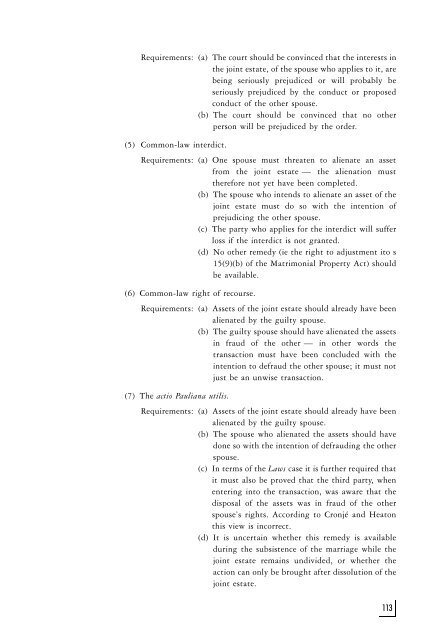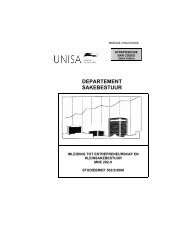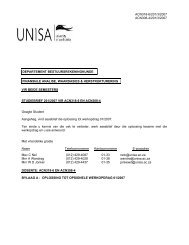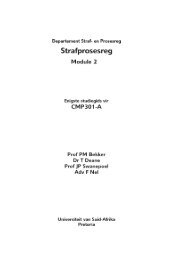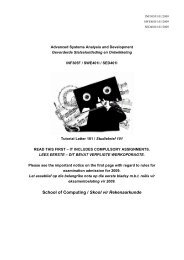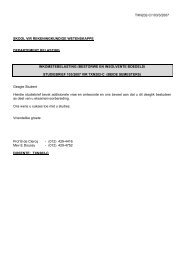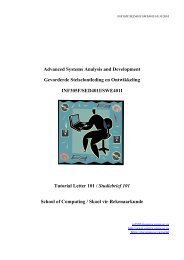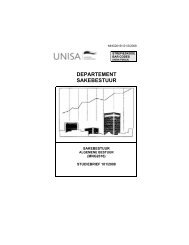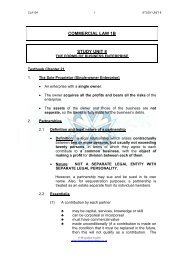key to the study guide - Name
key to the study guide - Name
key to the study guide - Name
You also want an ePaper? Increase the reach of your titles
YUMPU automatically turns print PDFs into web optimized ePapers that Google loves.
Requirements: (a) The court should be convinced that <strong>the</strong> interests in<br />
<strong>the</strong>jointestate,of<strong>the</strong>spousewhoapplies<strong>to</strong>it,are<br />
being seriously prejudiced or will probably be<br />
seriously prejudiced by <strong>the</strong> conduct or proposed<br />
conduct of <strong>the</strong> o<strong>the</strong>r spouse.<br />
(b) The court should be convinced that no o<strong>the</strong>r<br />
person will be prejudiced by <strong>the</strong> order.<br />
(5) Common-law interdict.<br />
Requirements: (a) One spouse must threaten <strong>to</strong> alienate an asset<br />
from <strong>the</strong> joint estate Ð <strong>the</strong> alienation must<br />
<strong>the</strong>refore not yet have been completed.<br />
(b) The spouse who intends <strong>to</strong> alienate an asset of <strong>the</strong><br />
joint estate must do so with <strong>the</strong> intention of<br />
prejudicing <strong>the</strong> o<strong>the</strong>r spouse.<br />
(c) The party who applies for <strong>the</strong> interdict will suffer<br />
loss if <strong>the</strong> interdict is not granted.<br />
(d) No o<strong>the</strong>r remedy (ie <strong>the</strong> right <strong>to</strong> adjustment i<strong>to</strong> s<br />
15(9)(b) of <strong>the</strong> Matrimonial Property Act) should<br />
be available.<br />
(6) Common-law right of recourse.<br />
Requirements: (a) Assets of <strong>the</strong> joint estate should already have been<br />
alienated by <strong>the</strong> guilty spouse.<br />
(b) The guilty spouse should have alienated <strong>the</strong> assets<br />
in fraud of <strong>the</strong> o<strong>the</strong>r Ð in o<strong>the</strong>r words <strong>the</strong><br />
transaction must have been concluded with <strong>the</strong><br />
intention <strong>to</strong> defraud <strong>the</strong> o<strong>the</strong>r spouse; it must not<br />
just be an unwise transaction.<br />
(7) The actio Pauliana utilis.<br />
Requirements: (a) Assets of <strong>the</strong> joint estate should already have been<br />
alienated by <strong>the</strong> guilty spouse.<br />
(b) The spouse who alienated <strong>the</strong> assets should have<br />
done so with <strong>the</strong> intention of defrauding <strong>the</strong> o<strong>the</strong>r<br />
spouse.<br />
(c) In terms of <strong>the</strong> Laws case it is fur<strong>the</strong>r required that<br />
it must also be proved that <strong>the</strong> third party, when<br />
entering in<strong>to</strong> <strong>the</strong> transaction, was aware that <strong>the</strong><br />
disposal of <strong>the</strong> assets was in fraud of <strong>the</strong> o<strong>the</strong>r<br />
spouse's rights. According <strong>to</strong> Cronje andHea<strong>to</strong>n<br />
this view is incorrect.<br />
(d) It is uncertain whe<strong>the</strong>r this remedy is available<br />
during <strong>the</strong> subsistence of <strong>the</strong> marriage while <strong>the</strong><br />
joint estate remains undivided, or whe<strong>the</strong>r <strong>the</strong><br />
action can only be brought after dissolution of <strong>the</strong><br />
joint estate.<br />
113


